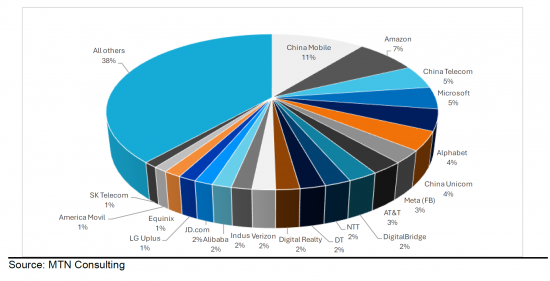|
市場調查報告書
商品編碼
1619728
隨著氣候變遷迅速惡化,企業邁出永續發展的第一步Operators Take Baby Steps Towards Sustainability as Climate Change Worsens Rapidly |
|||||||
2023 年電信業者的能源使用量成長將放緩至年增 4%。但電信公司也是氣候變遷的最大加劇者之一。排放量並沒有下降,我們需要加快採用再生能源。中國則遠遠落後。
該報告重點關注全球網路營運商的能源消耗和環境政策,提供有關能源需求、再生能源使用、排放和能源效率努力的數據。本報告是 2023 年發佈的報告的更新版,包含新的數據和分析。
視覺
2023 年全球 20 大電信業者能源消耗明細

全球應對氣候變遷的努力還遠遠不夠。根據聯合國預測,現行氣候政策將導致2100年全球暖化超過3.1°C。這是2015年《巴黎協定》中同意的暖化水準的兩倍。快速瀏覽全球新聞頭條就會發現,我們已經看到了許多極端天氣、人員流離失所和重大經濟損失。長此以往,地球將越來越不適合人類居住。人類將花費時間和金錢來清理最後一場大風暴的後果,而不是讓經濟走上更永續的軌道。
理論上,科技公司有機會引領應對氣候變遷的鬥爭,但現實是,網路營運商卻失敗得很慘。 2023 年,三個領域的能源消耗總量將持續成長。成長率已從過去三年的 9% 左右放緩至 2023 年的 4%。雖然成長放緩是好事,但營收成長進一步放緩可能反映了能源強度的輕微上升以及最近大規模領域人工智慧資料中心投資的激增。
那麼再生能源呢?只要能源是再生且無碳的,能源消耗本質上並不是一件壞事。就像汽車需要燃料一樣,經濟也需要能源才能運作。但營運商的數據令人不安。 2023年,再生能源佔電信業者總能源消耗的19.9%。這一數字逐年增加,高於 2019 年的 10.3%。但 20% 還很低,而且許多簡單的改變已經完成了。此外,2023 年電信公司的溫室氣體排放量將達到約 1.334 億噸(每 100 萬美元收入排放 75 噸),這兩個數字與 2019 年大致相同。如果承運商希望盡快實現碳中和目標,就需要積極解決這些排放問題,但這需要付出代價。至於網路擴展器,雖然他們的再生能源使用率很高,但在他們加入生成式人工智慧潮流之後,他們是否還能保持這項承諾還有待觀察。而當談到第三部分,即運營商中立時,情況就複雜了。一些CNNO正在大力投資能源效率和再生能源,並展示他們的綠色措施。其他人則基本上忽略了永續性問題。
提及的組織
|
|
目錄
- 摘要
- 電信業者能源消耗成長:2023 年放緩至 4%
- 三個細分市場的相對規模
- 能源:網路營運商的關鍵投入
- 依業務類型劃分的能源消耗
- 以公用事業類型劃分的能源強度
- 再生能源消耗與排放
- 附錄
Energy use growth by operators eased to 4% YoY in 2023 due to telcos, but they're also the worst climate offenders. Emissions are not falling; renewable energy adoption needs to accelerate. China lags badly.
This short report is focused on the energy consumption and environmental policies of the world's network operators. It presents data on energy demand, use of renewables, emissions, and energy efficiency efforts. This is an update of a report published in 2023 with new data and new analysis.
VISUALS
Breakdown of 2023 energy consumption by top 20 operators

The world's disparate efforts to address climate change are falling miserably short. Per the United Nations, current climate policies will result in global warming of more than 3.1C by the year 2100. That's twice the level of warming agreed upon in the 2015 Paris Agreement. A quick scan of the world's headlines will find many extreme weather events, population dislocations, and heavy economic damage already. If things continue, the planet will be less habitable for humans every year. Humanity will spend more time and money simply treading water - cleaning up after the last mega storm rather than putting economies on a more sustainable trajectory.
In theory, tech companies have an opportunity to lead in the fight against climate change. In practice, network operators are failing badly. Energy consumption continued to grow for the aggregate of the three segments in 2023. The growth rate dipped to 4% in 2023, from about 9% the previous three years. The slower growth is a plus, but: (1) revenues grew even more slowly, so energy intensity (consumption divided by revenue) increased slightly, and (2) a recent explosion of AI data center investment in the webscale sector will probably change the trendline in 2024.
How about renewables? There is nothing inherently bad about consuming energy, if it's renewable and carbon free. Economies need energy to run, just as your car needs fuel. However, data from the telco sector is disconcerting. In 2023, renewables accounted for 19.9% of total energy consumed by telcos. This figure has been rising by year, up from 10.3% in 2019. But 20% is low, and many easy changes have been made already. Further, greenhouse gas emissions (GHG) from telcos were about 133.4 million tons in 2023, or 75 tons per $1M in revenues; both figures are roughly the same as in 2019. If telcos are going to meet their carbon neutrality goals anytime soon, they need to attack these emissions aggressively, and that will cost. As for webscalers, they have a high rate of renewable use. Yet it's unclear if they will sustain this commitment now that they are on the GenAI bandwagon. For the third segment, carrier-neutral, it's a mixed bag. Some CNNOs invest heavily in energy efficiency and renewables, and some brag about their green practices. Others largely ignore questions of sustainability. The CNNO sector has absorbed assets from other segments over the years, so their infrastructure can have a patchwork quality, with different standards and designs in different regions. Also, sometimes CNNOs buy assets that are known to be energy hogs using dirty energy. Moreover, many CNNOs are owned by private equity or similar asset management firms, and don't publish financial data regularly, much less energy data. They face little to no public pressure to "go green." With right wing conservatives taking power in the US, there will be even less pressure on such companies.
Organizations mentioned:
|
|
Table of Contents
- Summary
- Operator energy consumption growth slows to 4% in 2023
- Relative size of three market segments
- Energy a key input for network operators
- Energy consumption by operator type
- Energy intensity by operator type
- Renewable energy use and emissions
- Appendix
List of Figures
- Figure 1: Three operator segments and their shares of global total in 2023
- Figure 2: Total energy consumption by operator type, GWh
- Figure 3: Total energy consumption, YoY growth rate by segment
- Figure 4: Breakdown of 2023 energy consumption by top 20 operators
- Figure 5: Energy intensity by operator type (MWH per US$M revenue)
- Figure 6: Energy intensity (MWh per $M in revenue): 2023 results for select operators
- Figure 7: Biggest improvements (i.e. reductions) in energy intensity since 2019
- Figure 8: Use of renewable energy in telecom, China v. rest of world
- Figure 9: Top 20 telcos based on renewable energy use adoption rates (2023)
- Figure 10: Use of renewable energy in telecom, China v. rest of world










